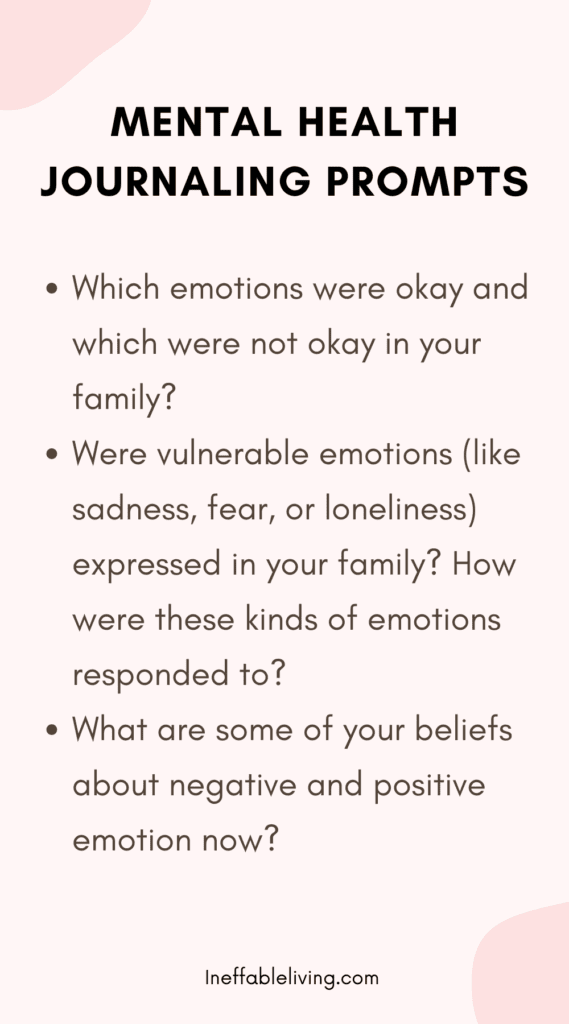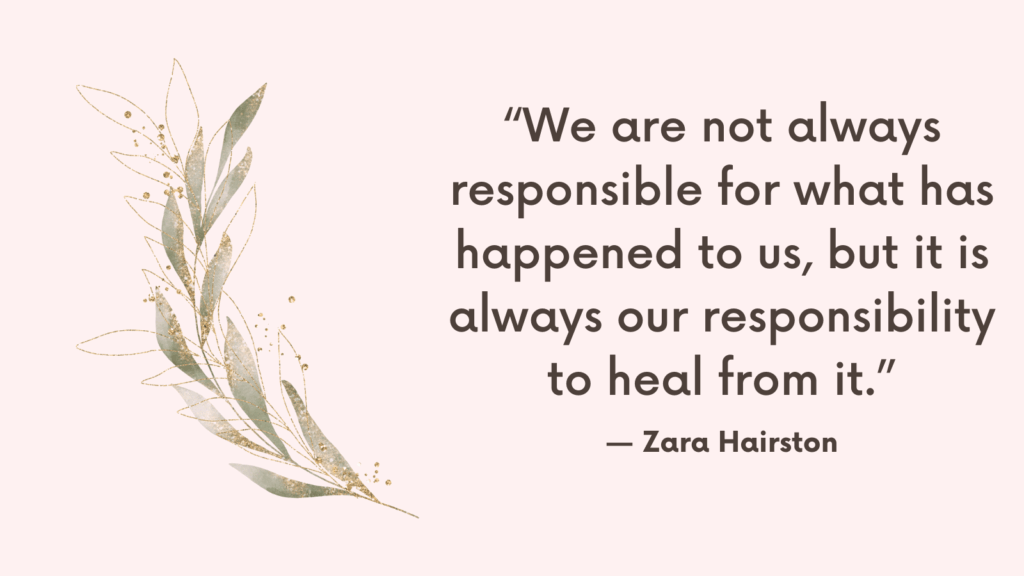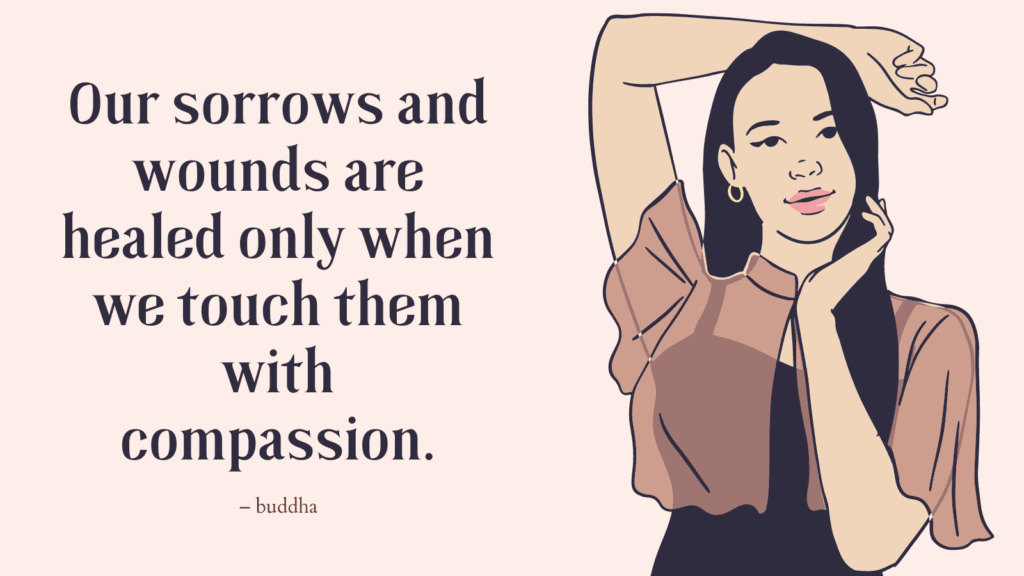Today, you’re going to learn all about healing the father wound.
What Is The Father Wound?
The father wound is the absence of love and acceptance from your father.
The father wound can be caused by:
- Neglect – physical or emotions
- Abuse – physical, emotional, sexual, or spiritual
- Absence – due to separation, divorce, or death
- Withholding – love and/or affirmation
Effects of the father wound include low self-esteem, feelings of inadequacy, shame, a performance orientation, etc.
The father wound also instills in us negative core beliefs, such as:
- I’m unlovable
- I’m unworthy
- I’m inadequate
- I’m not good enough
As long as we accept these words as truth, we will navigate life feeling depressed, anxious and angry.
What does the father wound look like?
Someone who had a critical father, might grow up feeling angry and resentful. They might also reproduce their “father wound” by copying what their father did to them and imposing the same treatment onto others.
Related: Healing From A Narcissistic Abuse By A Parent – 7 Practical Strategies
Father Wound Causes
- Your father didn’t have time for you
- You felt scared of your father
- Your father withheld love or food or money as punishment
- Your father was physically or emotionally absent
- Your father was highly critical of you
- Your father had painfully high expectation for you
What Does Father Wound Feel Like?
A father wound can manifest in various emotional and psychological ways, and the specific feelings experienced may differ from person to person.
However, some common emotions that individuals with a father wound may experience include:
1. Abandonment: A deep sense of feeling abandoned or rejected, often accompanied by feelings of sadness, loneliness, or emptiness.
2. Rejection: Feeling unloved or unwanted, leading to low self-esteem, self-doubt, or a constant need for validation.
3. Anger and resentment: Frustration, anger, or resentment towards the absent or neglectful father figure for not fulfilling their role or providing support.
4. Insecurity and attachment issues: Difficulties in forming secure attachments in relationships and a fear of abandonment or rejection.
5. Emotional numbness: A tendency to suppress or disconnect from emotions as a protective mechanism, making it challenging to connect with others emotionally.
6. Trust issues: Difficulty trusting others, especially male figures, due to past experiences of betrayal or emotional neglect.
7. Self-worth struggles: Feelings of inadequacy, self-doubt, or a lack of self-confidence due to the absence or negative influence of a father figure.
It’s important to remember that these feelings are not universal and can vary depending on individual experiences and coping mechanisms.
Recognizing and acknowledging these emotions is crucial in working towards healing and finding ways to cultivate a healthier self-perception.
FREE The Father Wound Worksheets
Healing The Father Wound
#1. Identify The Father Wound
Without getting into details or dwelling on it, name the injustice that you experienced.
Now assess the father wound by answering the following questions:
How hurtful was this act or series of acts?
What messages did you receive as a child that you want to erase. The following are some examples:
- ‘‘No man will want you.’’
- ‘‘You can never please anyone.’’
- ‘‘You’ll always be fat.’’
- ‘‘You’ll never measure up.’’
- ‘‘You’re a failure.’’
- ‘‘You’re no good.’’
- ‘‘You’re not pretty and never will be.’’
Related: Best 18 Self Compassion Journal Prompts (+FREE Worksheets)
#2. Challenge Negative Messages
Once you identified negative messages from your father and childhood, start to challenge them with questions such as:
- Do I have experiences that would contradict my thoughts in any way?
- Am I condemning myself as a total person on the basis of a single event or the opinion of a single person?
- Am I blaming myself for something which is not really my fault?
- Am I taking something personally which has little or nothing to do with me?
- Am I expecting myself to be perfect?
- What would I tell a friend if they had the same thought?
- What would a friend say about my thought?
Related: Negative Core Beliefs List (& 8 Tips On How To Challenge Them)
#3. Identify Enmeshment
Some people don’t have the problem of an absent or emotionally unavailable father.
Instead, their father has been too involved in their lives.
When there is too much enmeshment, it’s called emotional incest.
In such cases, the father is using his child for his own fulfillment.
How do you know if this is the case? Does any of the following sound familiar?
- There is a lack of privacy between your father and you
- Your father expects you to be their best friends and always confide in them
- Your father is overly involved in your life
- You receive praise for maintaining the relationship’s status quo
Related: How To Set Boundaries With Narcissistic Parents?
#4. Get to Know Your Father
How was your father’s childhood? Was he mistreated or bullied?
What was his adolescence and early adulthood like?
What was he going through while raising you?
Those questions aren’t meant to excuse what your father did, but they can help you externalize the blame.
Rather than believing that your father hurt you because you were unlovable or not worthy, you begin to realize that what he did wasn’t about you, but rather a reflection of the person he is and the circumstances he has been through.
Use this list of traits to get to know your father better: List of Traits Download PDF

#5. Let Go of Self-Blame
Self-blame is a common symptom of the father wound.
We need to make sense of what happened. Yet, most of us won’t blame our fathers.
Instead, we blame and hold ourselves accountable for what others have done.
Common self-blaming thoughts include:
- “I must have done something to make it happen.”
- “I didn’t do all I could to prevent it from happening.”
- “I should have said no more forcibly.”
- “I could have done more.”
- ‘‘I should have seen it coming.’’
- “I have ignored the signs of what might happen.”
- “I expected too much.”
- ‘‘If only I had been better, smarter, more compliant, prettier, stronger born a boy,. . . .’’
- ‘‘If only I had not . . .’’
Such statements express regret. But you can’t hold yourself responsible for what didn’t know or couldn’t have done as a child.
When we self-blame, we are punishing ourselves. It doesn’t help us.
Challenge your self-blaming thoughts by asking yourself:
- What evidence do I have that my self-blaming thoughts are not accurate?
- What would I tell a friend in the same situation?
Related: Top 39 Self Love Mantras To Practice Daily (+9 Ways To Grow In Self-Love)
#6. Get Closure
Father wounds can leave us with unprocessed grief, which usually manifest as feelings of anger and sadness.
Try this writing exercise to gain closure and process your hurt.
Write a letter to your father than you don’t send.
Start with facts about what happening during your childhood. Write down all the ways your father hurt you or failed you. Write down about how it affected your life.
You may also take this a step further and write a letter from your father to yourself where you write down everything you would have wanted to hear from him.
Related: Forgiving Someone Who Isn’t Sorry: 9-Step Guide To Free Yourself From The Past
#7. Seek Support
You may feel alone in your grief over your father. That might be true. There aren’t many support groups for father wounds.
But support is a great resource in healing father wounds.
Find a supportive friend or seek the help of a mental health professional who understands the grief process can help you move forward.
Psychologist Locator and the National Register are two websites for locating psychologists in USA.
Online therapy is also an option. It can be much affordable than in-person therapy, but can be equally effective. (source)
Related: FREE Therapy Journal Template
Conclusion
Your father may have been a central part of your life, or he might have been absent.
Either way, it’s important to understand your father’s influence upon your life and heal your wounds.

References
- Portions of this article were adapted from the book Healing for the Father Wound: A Trusted Christian Counselor Offers Time-Tested Advice, © 2008 by H. Norman Wright. All rights reserved.
- Portions of this article were adapted from the book The Absent Father Effect on Daughters, © 2020 by Susan E. Schwartz. All rights reserved.
- How to Heal from a “Father-Wound” | Psychology Today
- Healing Your Mother (or Father) Wound – Dharma Wisdom



